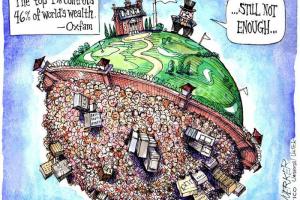Walter Rodney and the Racial Underpinnings of Global Inequality
Items
 While inequality has become a topic of increased popularity and politicization in recent years, most of the attention has focused on how 1% own an increasingly large share of the world’s wealth, rather than on inequalities between nations. In a global context in which national borders and citizenship pose few barriers to the mobility of capital, the reality is also a story of the world’s richest nations continuing to reap a disproportionate amount of the globe’s profits.
While inequality has become a topic of increased popularity and politicization in recent years, most of the attention has focused on how 1% own an increasingly large share of the world’s wealth, rather than on inequalities between nations. In a global context in which national borders and citizenship pose few barriers to the mobility of capital, the reality is also a story of the world’s richest nations continuing to reap a disproportionate amount of the globe’s profits.










Spread the word